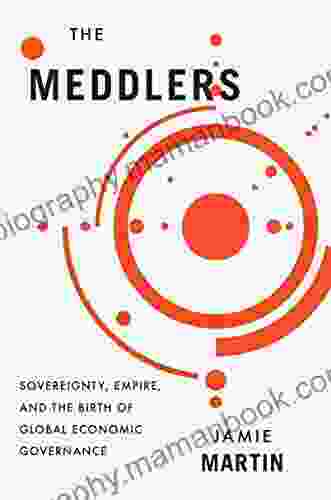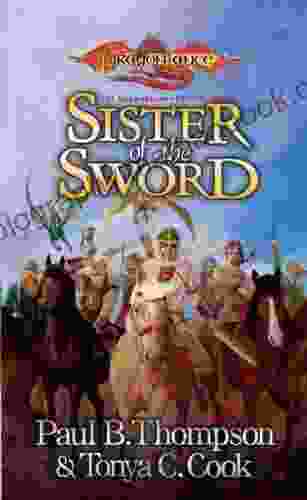Sovereignty, Empire, and the Birth of Global Economic Governance: A Historical Perspective

The rise of global economic governance has been one of the defining features of the 21st century. Today, a complex web of international institutions, rules, and norms govern the global economy, shaping everything from trade and finance to climate change and labor standards. But how did this global economic governance system come to be? And what role has the concept of sovereignty played in its development?
This article explores the historical relationship between sovereignty, empire, and global economic governance. It argues that the emergence of global economic governance can be traced back to the European empires of the 19th century. These empires, with their vast networks of colonies and dependencies, created a global economic system that was both deeply hierarchical and deeply interconnected.
4.3 out of 5
| Language | : | English |
| File size | : | 50204 KB |
| Text-to-Speech | : | Enabled |
| Screen Reader | : | Supported |
| Enhanced typesetting | : | Enabled |
| Word Wise | : | Enabled |
| Print length | : | 345 pages |
In order to manage this complex system, the European empires developed a range of international institutions and rules. These institutions, such as the International Monetary Fund (IMF) and the World Bank, were designed to promote economic cooperation and stability. However, they were also designed to maintain the empires' own economic dominance.
The post-World War II era saw the decline of the European empires and the rise of the United States as the world's dominant economic power. The United States used its economic power to reshape the global economic governance system. It created new international institutions, such as the General Agreement on Tariffs and Trade (GATT),and it pushed for the adoption of neoliberal economic policies.
The neoliberal era has been marked by a dramatic increase in global economic interdependence. However, it has also been marked by rising inequality and environmental degradation. In recent years, there has been a growing backlash against neoliberalism and a renewed interest in the concept of sovereignty.
Sovereignty and Empire
The concept of sovereignty is central to the modern state system. Sovereignty refers to the supreme authority of a state over its territory and population. It is the right to govern oneself without external interference.
The idea of sovereignty emerged in Europe in the 16th century, as a way to legitimize the power of the new nation-states. These states were in constant conflict with each other, and they needed a way to justify their claims to territory and authority.
The concept of sovereignty provided a way to do this. By declaring themselves sovereign, states could claim the right to make and enforce laws within their own borders, free from outside interference.
However, the concept of sovereignty was also used to justify the European empires. The European powers argued that they had the right to rule over their colonies because they were sovereign states. They claimed that the people of their colonies were not capable of governing themselves, and that they needed to be ruled by Europeans in order to be civilized.
The European empires used their economic power to maintain their control over their colonies. They imposed tariffs and other trade barriers to protect their own industries. They also exploited the resources of their colonies, often at the expense of the local population.
The European empires' system of global economic governance was deeply hierarchical. The European powers were at the top of the hierarchy, and the colonies were at the bottom. This system was designed to maintain the economic dominance of the European powers and to prevent the colonies from developing their own economies.
The Birth of Global Economic Governance
The European empires' system of global economic governance began to crumble in the 19th century. The rise of nationalism and the industrial revolution led to a growing demand for self-determination among the peoples of the colonies.
In the aftermath of World War II, the European empires were dismantled and the United States emerged as the world's dominant economic power. The United States used its economic power to reshape the global economic governance system.
The United States created new international institutions, such as the IMF and the World Bank. These institutions were designed to promote economic cooperation and stability. However, they were also designed to maintain the United States' own economic dominance.
The United States used its economic power to pressure other countries to adopt its own economic policies. These policies, which became known as neoliberalism, emphasized free trade, deregulation, and privatization.
Neoliberalism has been the dominant economic paradigm since the 1980s. It has led to a dramatic increase in global economic interdependence. However, it has also been marked by rising inequality and environmental degradation.
The Challenges to Global Economic Governance
The global economic governance system faces a number of challenges in the 21st century. These challenges include:
* The rise of China: China is now the world's second-largest economy. It is rapidly increasing its economic power and influence. This is putting pressure on the United States' dominance of the global economic governance system. * The global financial crisis: The 2008 global financial crisis exposed the weaknesses of the global economic governance system. The crisis showed that the system is not effective at preventing or responding to financial crises. * Climate change: Climate change is a major threat to the global economy. It is causing sea levels to rise, droughts to become more severe, and extreme weather events to become more frequent. The global economic governance system needs to be reformed to address climate change. * Inequality: Inequality is a major problem in the global economy. The gap between the rich and the poor is growing. This is creating social and political instability. The global economic governance system needs to be reformed to reduce inequality.
The global economic governance system is at a crossroads. It faces a number of challenges that need to be addressed. If the system is not reformed, it could lead to a global economic crisis.
One of the most important challenges facing the global economic governance system is the need to reconcile the concept of sovereignty with the need for global cooperation. The global economy is increasingly interconnected, and it is no longer possible for countries to govern themselves without taking into account the impact of their actions on other countries.
The concept of sovereignty needs to be reinterpreted to reflect the realities of the 21st century. It must be recognized that sovereignty is not absolute, and that it is sometimes necessary to cede some sovereignty in order to achieve common goals.
The global economic governance system must also be reformed to make it more democratic and accountable. The current system is dominated by a small number of powerful countries, and it does not adequately represent the interests of the majority of the world's population.
The global economic governance system needs to be reformed to make it more inclusive and sustainable. It must be a system that works for all, not just for the few.
4.3 out of 5
| Language | : | English |
| File size | : | 50204 KB |
| Text-to-Speech | : | Enabled |
| Screen Reader | : | Supported |
| Enhanced typesetting | : | Enabled |
| Word Wise | : | Enabled |
| Print length | : | 345 pages |
Do you want to contribute by writing guest posts on this blog?
Please contact us and send us a resume of previous articles that you have written.
 Top Book
Top Book Novel
Novel Fiction
Fiction Nonfiction
Nonfiction Literature
Literature Paperback
Paperback Hardcover
Hardcover E-book
E-book Audiobook
Audiobook Bestseller
Bestseller Classic
Classic Mystery
Mystery Thriller
Thriller Romance
Romance Fantasy
Fantasy Science Fiction
Science Fiction Biography
Biography Memoir
Memoir Autobiography
Autobiography Poetry
Poetry Drama
Drama Historical Fiction
Historical Fiction Self-help
Self-help Young Adult
Young Adult Childrens Books
Childrens Books Graphic Novel
Graphic Novel Anthology
Anthology Series
Series Encyclopedia
Encyclopedia Reference
Reference Guidebook
Guidebook Textbook
Textbook Workbook
Workbook Journal
Journal Diary
Diary Manuscript
Manuscript Folio
Folio Pulp Fiction
Pulp Fiction Short Stories
Short Stories Fairy Tales
Fairy Tales Fables
Fables Mythology
Mythology Philosophy
Philosophy Religion
Religion Spirituality
Spirituality Essays
Essays Critique
Critique Commentary
Commentary Glossary
Glossary Bibliography
Bibliography Index
Index Table of Contents
Table of Contents Preface
Preface Introduction
Introduction Foreword
Foreword Afterword
Afterword Appendices
Appendices Annotations
Annotations Footnotes
Footnotes Epilogue
Epilogue Prologue
Prologue Zita Grant
Zita Grant Lord Alfred Tennyson
Lord Alfred Tennyson Pernille Rudlin
Pernille Rudlin Sarah M Broom
Sarah M Broom Keith Bishop
Keith Bishop Angel Rayne
Angel Rayne Robert J Starratt
Robert J Starratt Kristen Green
Kristen Green Andrea Hicks
Andrea Hicks Andy Evans
Andy Evans Bernard Connolly
Bernard Connolly Andries Louws
Andries Louws Ashley Mcleo
Ashley Mcleo Michael Tavon
Michael Tavon Jennifer R Lee
Jennifer R Lee R L Naquin
R L Naquin H A Mckenna
H A Mckenna Bill Lubanovic
Bill Lubanovic Andrew Tobias
Andrew Tobias Jennifer Clouston
Jennifer Clouston
Light bulbAdvertise smarter! Our strategic ad space ensures maximum exposure. Reserve your spot today!
 Bradley DixonFollow ·7.6k
Bradley DixonFollow ·7.6k Colt SimmonsFollow ·7.9k
Colt SimmonsFollow ·7.9k Wayne CarterFollow ·19.9k
Wayne CarterFollow ·19.9k Sidney CoxFollow ·9.8k
Sidney CoxFollow ·9.8k Fletcher MitchellFollow ·7.7k
Fletcher MitchellFollow ·7.7k William WordsworthFollow ·14.2k
William WordsworthFollow ·14.2k Hayden MitchellFollow ·19k
Hayden MitchellFollow ·19k Reginald CoxFollow ·18.7k
Reginald CoxFollow ·18.7k

 Barry Bryant
Barry BryantKnitting Pattern Kp190 Baby Sleeping Bags Sizes 3mths...
This easy-to-follow...

 Rudyard Kipling
Rudyard KiplingFolk Music Arrangements of Bartók: A Musical Tapestry of...
Béla Bartók, the renowned...

 Garrett Bell
Garrett BellThe Yellow House Memoir: A Literary Masterpiece that...
A Journey of Resilience,...

 George Martin
George MartinAssassin Witch Dark Faerie: The Bonegates
In the shadowy...
4.3 out of 5
| Language | : | English |
| File size | : | 50204 KB |
| Text-to-Speech | : | Enabled |
| Screen Reader | : | Supported |
| Enhanced typesetting | : | Enabled |
| Word Wise | : | Enabled |
| Print length | : | 345 pages |
















